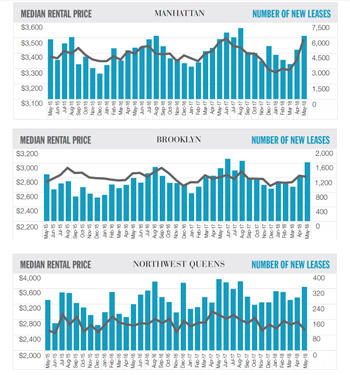Following five consecutive months of decline, Manhattan saw its first increase in rent thanks to a growing demand for larger apartments.
The median net effective rent, which accounts for concessions, rose 0.4 percent year-over-year in May to $3,392, according to Douglas Elliman’s latest rental report. But the trend was largely driven by the surge in new leases for larger apartments, as the high-end sales market remains soft, the report said.
“You’re seeing some of that decline in sales demand being translated into people taking advantage of rentals,” said Jonathan Miller, CEO of appraisal firm Miller Samuel and the author of the report. “The market is still soft and that has presented an opportunity for people [who] are temporarily pausing in the purchase process” as they evaluate the new tax law and higher interest rates.
Meanwhile, 37.6 percent of new leases included landlord concessions — the lowest level this year and down from 44.3 percent in April. That’s primarily due to seasonality, as the rental market heads into the stronger summer season, Miller said. Given that concession market share has been rising year over year for 36 consecutive months, incentives are “still a significant factor,” he added. It would take a serious decrease in the amount of supply coming to the market every month to dislodge them, industry players recently told The Real Deal.
A separate report by Citi Habitats noted that as the vacancy rate has declined for over six months, the use of move-in incentives has also recently dropped. The last time the firm saw vacancies fall for such a stretch of time was between December 2013 and June 2014.
“Through their effective use of concessions, owners have dramatically reduced the vacancy rate over the last six months,” Gary Malin, president of Citi Habitats, said in a statement. “Since February, they have begun to dial back the freebees offered to new residents — while keeping their face rents relatively unchanged.”
